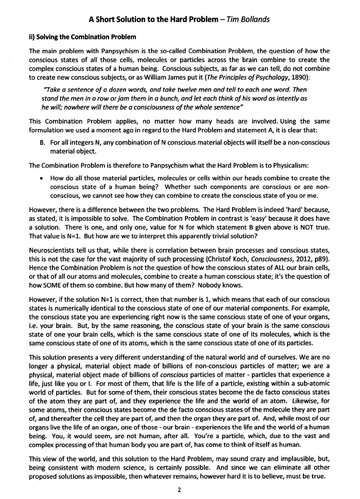Although a neuroscientist would likely disagree, metaphysics must be discussed when exploring the nature of consciousness.
The following is an excellent talk given by theoretical physicist David Tong via the Royal Institute series. He prefaced the talk by asking “what are we made of?”
Seems to me that Tong and his colleagues have subtly changed the playing ground as to what physicists consider the “fundamental” essence of reality. According to Tong’s talk, contrary to deeply ingrained popular belief even among scientists, particles of the Standard Model are
not the fundamental essence of reality, but instead, infinitely vast, three dimensional “fields” out from which the particles arise.
In other words, many three dimensional, interpenetrating fields are actually what support all the tiny, localized vibrations that we know as the various “particles” that make up the universe. Thus, all the expansive three-dimensional fields for particles must exist
prior to the existence of any particle. That means that all the physical structures of the universe, from quarks to galactic superclusters, are all suspended in and produced out of these ubiquitous “fields” from which Standard Model particles arise.
Tong goes on to assert, without evidence, that these fields are “fundamental” as if he knows all about these fields. Personally, I doubt that he or his colleagues know much about the fields, nor if they are actually
the fundamental essence of reality. It seems quite possible that these fields themselves are composed of their own essential particles so tremendously far below (i.e. smaller than) those of our Standard Model. If so, then I don’t really see any way for humans to use any of our Standard Model-sized measuring apparatus to ever discover much about the nature of these fields.
On the other hand, as Soupie seems to suggest, if these so-called “fields” are the actual basis from which arises all that we see around us as Standard Model physics, then there very well may be extremely fine structures (at unmeasurably small scales) within these fields that make crucial contributions to the differentiation of particles of the Standard Model. Even more, such unmeasurable fine structures may also very well be crucial to the nature of consciousness. In other words, perhaps very deeply below the Standard Model particles that make up our bodies and brains, our sensations of consciousness may actually reside in infinitesimally small fine structures at the level of the essence of these fields.
Various guests on the Paracast present challenging evidence of what we might call “sapiens class intelligent entities” but that are not human beings, and these entities are often reported as virtually undetectable until they choose to make themselves known to us. Some of the paranormal evidence presented also challenges conventional understandings of physics, such as the recent Nimitz anomalous objects.
So, perhaps non-human sapiens class intelligent entities made up of fine structures at the essential levels of the fields actually do exist alongside of us humans. Since we are so overwhelmed by the Standard Model size of things, we cannot easily detect them. It would not be inconceivable that such non-humans could manipulate the fields that support Standard Model physics in ways that seem impossible to us. Perhaps at the "field" level they are not bound to the same “physics” that we are. So, they could operate from below our Standard Model and manipulate our reality as they please. Perhaps.
Such non-human beings would thus not actually be "interdimensional" but they would conceivably be able to manifest however they like at the Standard Model level of physics, and also demanifest at will. Maybe.



 . Ultimately that may be the most important aspect of the whole question! After all, what point is consciousness if one never gets any satisfaction from the experience?
. Ultimately that may be the most important aspect of the whole question! After all, what point is consciousness if one never gets any satisfaction from the experience?